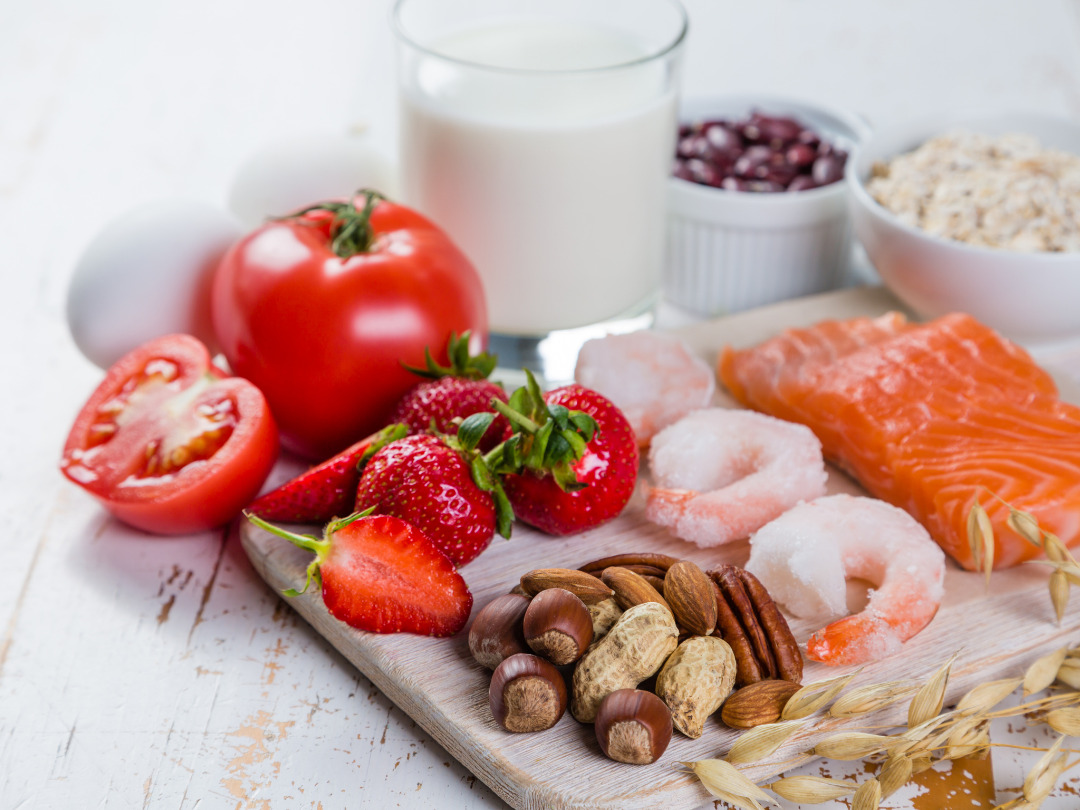
Food allergies, reflux, colic & eczema
If you’re already dealing with suspected food allergies before your baby starts weaning or you’ve got another child who suffers with an allergy, I’m guessing you’re not much looking forward to the next step of introducing solids. It’s easy to get panicked and focus only on the foods that your baby can’t have, but with a bit of planning and investigating life can be easier. This blog is going to touch on just a few of the things that you might be thinking about – the field of allergies is HUGE and there is too much to cover here!
Allergy diagnosis
Lots of babies show signs of food allergy before the age of 6 months. You might be advised to cut certain foods from your diet if breastfeeding/expressing, or you might have to switch to a special allergy formula. What’s important to remember here is that allergy diagnosis is rarely black and white – sometimes babies are diagnosed with allergies, when in fact they are displaying ‘normal’ behaviour – remember ‘normal’ is a scale and it often doesn’t tie into how we think babies should behave. Other times baby will have outgrown their allergy come weaning time. Speak to your care provider to find out what the next steps are for your baby. And remember, you have the right to question what you’re being told and get a second opinion. Allergy Research UK are a great source of evidence-based information.
Reflux & colic
Both reflux and colic can be signs of a food allergy (but not always), although from my experience allergies are rarely considered as the underlying cause. It’s really important to point out that all babies will have some degree of ‘reflux’ which reduces overtime and there are many cases of healthy babies being given medication for reflux when in fact they are showing normal behaviour that could be helped in other ways! If you’re breast feeding, make sure you get a full feeding assessment done before turning to medication.
Eczema
If your baby develops eczema in the early months, then they are more likely to have a food allergy. In some cases, the eczema is a symptom of the allergy i.e. cow’s milk protein allergy (CMPA) or an allergy to something else via breastmilk, but in others it’s thought the eczema can contribute towards the development of food allergy. It’s a good idea to get on top of it as soon as possible and maintain the skin barrier.
Testing
You may have been told that babies cannot be allergy tested. This isn’t correct! Skin prick tests, blood tests and even patch tests are performed every day on babies with suspected food allergies. However, these tests will only diagnose IgE allergies – the more immediate type of allergy. Delayed, or non-IgE allergies have to be tested for with a food exclusion and reintroduction. In the UK we don’t tend to test before weaning as allergy tests are not 100% accurate and we need to be sure that a child has been exposed to the allergen before testing as most reactions don’t happen on first exposure.
Introducing potential allergens
If you have been given the go ahead to introduce the potential allergen to your baby, or perhaps you’re from a family with lots of atopic conditions like eczema, hay fever or food allergies, then the best way to introduce the top allergenic foods is to do it slowly and one at a time. Choose one allergen to introduce and give it every day for 3 days. This should be long enough to see if there is any delayed reaction, as well as something more immediate. If there is no issue, then you’ll need to continue to give the food at least twice a week going forward.
These are the most common food allergens in the UK:
- Cow’s milk, egg
- Wheat, gluten, soya
- Fish, shellfish
- Sesame and other seeds
- Peanuts and tree nuts
When there is a reaction
If you suspect that a food is causing an issue for your baby stop giving it and speak to your care provider. If there is any swelling around the mouth or eyes, any changes in breathing, or coughing then ring 111. It’s also a good idea to keep a bottle of Piriton in the cupboard. This can only be used for babies under 12 months under medical advice but you might be advised over the phone to use it.
If you suspect a more delayed reaction then you should keep a dairy of food and symptoms to see if you can pinpoint the issue. It’s often hard to tell if a food is causing an issue because babies are constantly teething, catching colds and generally testing their immune system!
Living with food allergies
Many babies will still outgrow allergies by the age of 5 years and during that time you might be advised to start with a food ladder – these are common for both non-IgE milk and egg allergies. But you want to be able to live with the allergies as best as you can. A lot will depend on the severity of the allergy and the consequences, but it’s never been easier to live with food allergy. More people are aware of them, new laws mean that food must be labelled for allergens and there are plenty of chefs developing amazing allergen free recipes that all the family can enjoy. It’s best to avoid as many of the ‘free-from’ foods as possible as these are heavily processed to replicate the original food. Instead try and change your way of thinking and pick foods that are naturally free from the allergen. Fortunately, there are some great choices for dairy free milks, plain yoghurts and cheeses that babies will love and can even be used by the rest of the family.
The key to adapting with food allergies is getting the right information and finding a support network – families who are going through the same things as you. The Weaning Hub is the perfect place for this! Drop us a line if you want to know more or come and chat in our free group Facebook group Food for fertility, bump & beyond.
By Nicola, I Love Greens
